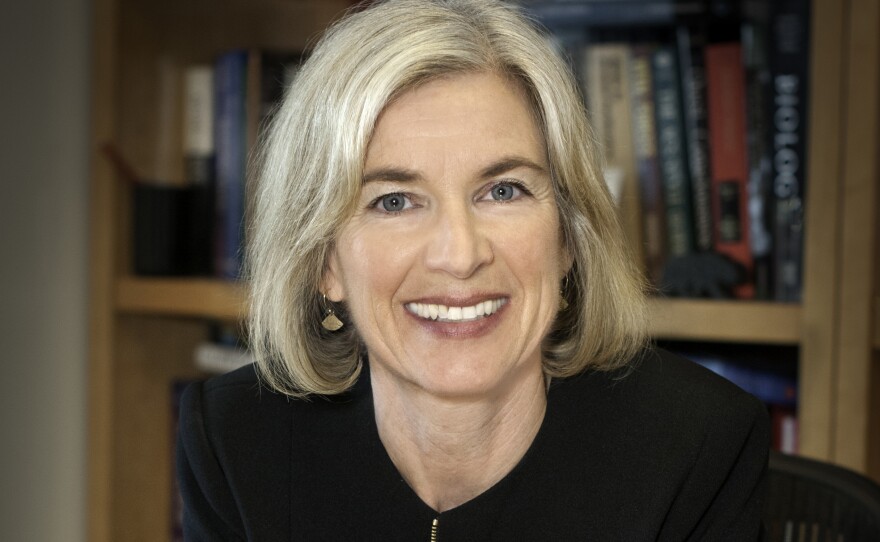Jennifer Doudna, the co-founder of CRISPR — a technology that can edit or alter DNA and genetic traits — came to San Diego on Monday to receive the Scripps Institution of Oceanography's 2019 Nierenberg Prize for Science in the Public Interest.
Doudna co-discovered CRISPR-Cas9, a gene-editing tool, with her colleague Emmanuelle Charpentier in 2012. In a nutshell, CRISPR is a protein that can go into a cell or tissue in any biological organism, like plants, animals and humans.
And like scissors, CRISPR can cut a string of DNA open. When that happens, DNA coding can be altered. And genes or biological traits can be changed.
KPBS got a chance to speak with Doudna about the future of gene editing and the ethical concerns surrounding it.
"What I’m excited about is the opportunity to cure genetic diseases. Things like sickle cell anemia and Huntington's disease. Potentially in the future something like cystic fibrosis," Doudna said.
"And what CRISPR technology does is to provide a strategy for mitigating those disease-causing mutations. That’s not a fantasy. It’s not 200 years in the future. It’s something I think over the next decade, we will see those kinds of cures coming to fruition," Doudna said.
In July, doctors for the first time in the United States officially used CRISPR to treat a patient with sickle cell anemia, a disease that creates deformed blood cells, which can cause a shortened life span and some painful conditions.
Doctors used CRISPR to give the patient her own, but modified blood cells. She’s being monitored by doctors to see whether her conditions improve.
But, while examples like these show promise, some ethicists have raised questions, because CRISPR is widely deployed around the world.
"I think any time a powerful technology comes along, it comes with both opportunities to create great benefits for society, but also risks," Doudna said.
"For example, [one risk could be] being able to change the DNA in developing humans that would create changes to DNA that affect not only the individual but that can be inherited by future generations," Doudna said. "So that’s something that I’ve been working on for several years with my colleagues to educate people about that possibility."
A simple Google search of “gene editing” brings up a mixed bag of stories. Some are on the potential for CRISPR to create genetically modified crops that can resist climate change. Many talks about using CRISPR to cure diseases. But these exist alongside headlines about designer babies and super soldiers for the military.
A new Netflix series, titled “Unnatural Selection,” considers how far CRISPR can go. It also makes it seem like CRISPR technology is fairly easy to access.
Doudna says while gene editing is widely available, it still requires biochemical expertise to use.
"I think it’s important to separate fact from fiction. Of course, storytellers love to scare us and bring up ideas that are fantastical and I think that’s true of this Netflix series," Doudna said. "But I think it’s important for people to understand that those of us who are actually working in the field appreciate that this technology has tremendous positive potential."
Doudna said there are a lot of next steps for her when it comes to developing this technology. But, for now, she’s working on organizing a genetic research nonprofit in the San Francisco Bay Area. The goal, she said, is to take practical biomedical ideas off the ground and to make sure gene editing is equitable.
"I don’t personally want to create a cure for a genetic disease that’s only affordable by the .001%," she said.
Doudna said funding for science for the sake of curiosity is a huge part of making sure this research can happen.
"Why should the public support curiosity-driven scientific research? The reason is that’s how science is. We don’t know where it’s going in the future," Doudna said.
"The purpose is to understand our world and every now and then you turn over the proverbial rock and you find something wonderful. And, that was the case with CRISPR," Doudna said.







